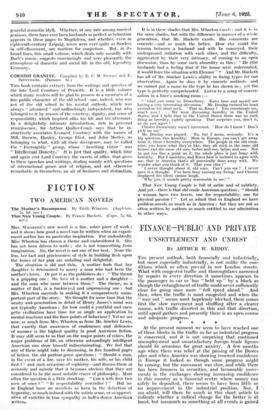FICTION
TWO AMERICAN NOVELS
That Nice Young Couple. By Francis Hackett. (Cape. 7s. exi. net.) .MRS. WHARTON'S new novel is a fine, sober piece of work ; and it shows how good a novel can be written when an experi- enced author has no particular inspiration. For undoubtedly -Miss Wharton has chosen a theme and embroidered it. She has not been driven to write ; she is not transcribing from imagination. No, the novel is not one of her best. None the .less, her tact and graciousness of style in building flesh upon the bones of her plot are unfailing and delightful.
The situation is old and thin. A mother finds that her daughter is determined to marry a man who had been the mother's lover. Or put it as the publishers do : , " The theme is n gripping one ; the love of a mother and a daughter-- and the man who came between them." The theme, as a _ matter of fact, is a hackneyed and unpromising one ; but Mrs. Wharton succeeds in making it a comparatively unim- portant part of the story. We thought for some time that the 'acuity and penetration in detail of Henry James's mind was not typically American ; for how could a youthful and ener- ' getic 'ciViliiation have time for so single an application to mental reactions and the flner'points of behaviour? Yet we see now, as much from Mrs. Wharton as from Mr. Sinclair Lewis, that exactly that awareness of crudenesses and delicacies of manner is the highest quality in good American fiction. It may still seem to us that on the major points of ethics, the major problems of life, an otherwise astoundingly intelligent American can show himself indiscriminating. We feel that any of them might take to discussing, in five hundred pages of fiction, the old parlour-game questions : " Should a man, in the event of a fire, save his mother, his wife, or his child first ?" and such occasions of sophistry—and discuss them so seriously and naively that it becomes obvious that they are considered to be the most notable cruces of philosophy. More often the question is a little shocking. " Can a wife love two men at once ? " " Is respectability cowardice ? " But we in IiIngland have no novelists so keen in the detection of hypbcrisy, so much imbued with the satiric sense, or so appreci-
ative otvarietieein true sympathy as half;a-dozen Aniericalt 'writers.
It is in these shades that Mrs. Wharton excels ; and -it is in the same shades, but with the difference in manner of a whole generation,- that Mr. Hackett excels. His comments are concrete—and so much the better. How else could the tension between a husband and wife be conveyed, their underground irritation with each other, and the difficulty, aggravated by their very intimacy, of coming to an open discussion, than by some such absurdity as this : " He (the husband) had a feeling that if the house were redecorated, it would force the situation with Eleanor " ? And Mr. Hackett has all of Mr. Sinclair Lewis's ability in fixing types for our observation. Again he does it by concrete methods—and we cannot put a name to the type he has shown us ; yet the type is perfectly comprehended. Listen to a scrap of conver- sation in a liner's smoking-room :— " Glad you come in, Dusenberry. Knox here and myself are having a very interesting discussion.' Mr. Dunlap twisted his head around on his short neck. ' That so, Knox ? You corroborate me wot you ? . . . We were .discussing heredity in the United States, and I held that in the United States there was no such thing as heredity, rightly speaking. That surprises you, don't it, or do you agree ? '
Chester Dusenberry wasn't interested. How do I know ? Don't pick on me.'
Mr. Dunlap was piqued. No, but I mean, seriously. It's a big question, this heredity. Here in Europe, you can't get away from it, there's heredity everywhere. The people in the old coun- tries, you know what they're like, they all stick in the same old houses and the same old ruts, father and son, father and son. Not to put too fine a point on it, the whole place is just lousy with heredity. But I maintain, and Knox here is inclined to agree with me, that in America that's all practically done away with. We i - wonder what you think of it. That your idea ? '
' I never thought about it, old man. Can't you see ? I never gave it a thought. I've been busy earning my living,' and Chester displayed his silent canine laugh.
Why yes, it sounds pretty reasonable to me.' "
That Nice Young Couple is full of satire and of subtlety. And yet—there is that old crude American question : " Should a woman have two lovers, one for respectability, one for physical passion ? " Let us admit that in England we have problem-novels as much as in America ; but they are not so often written by authors so much entitled to our admiration in other ways.














































 Previous page
Previous page